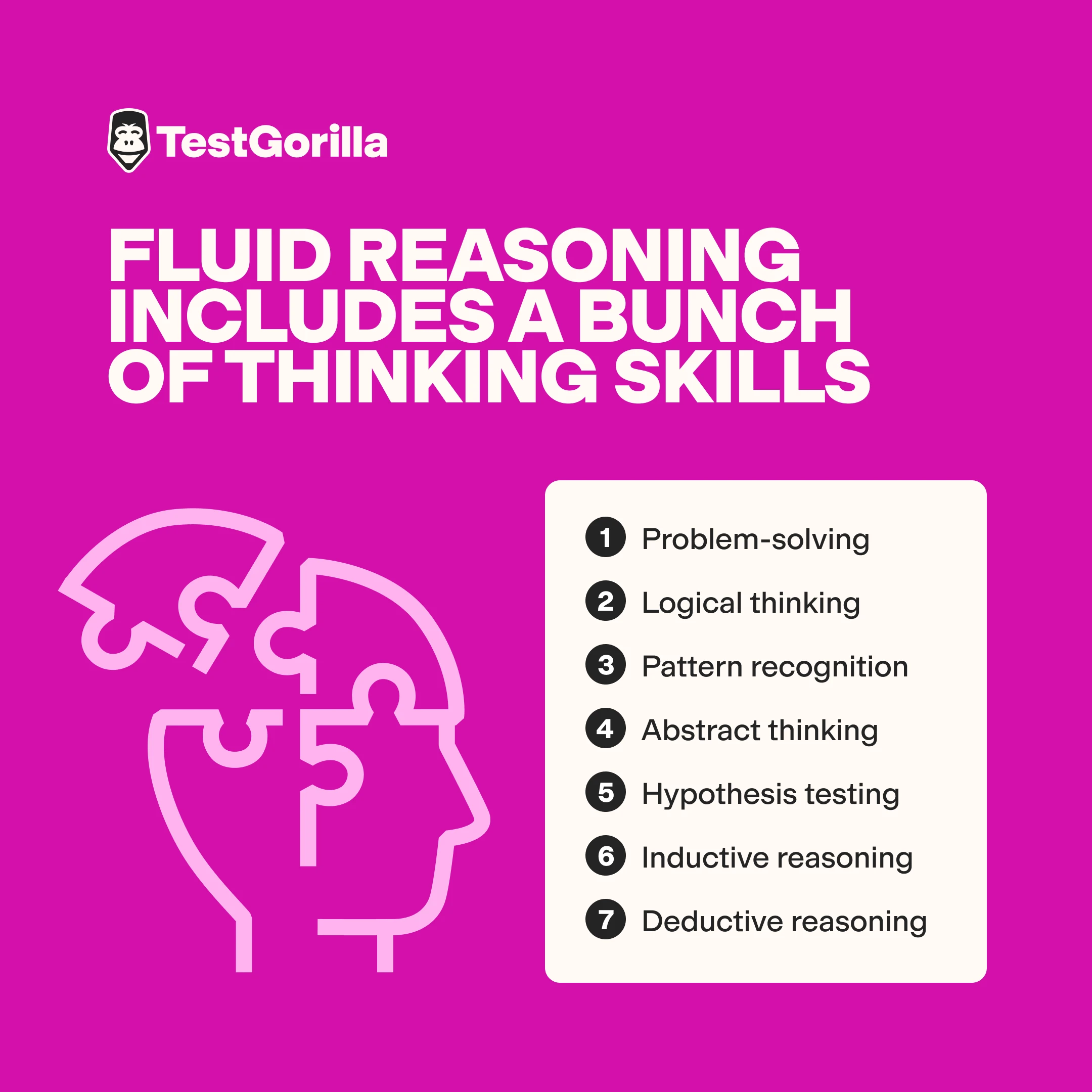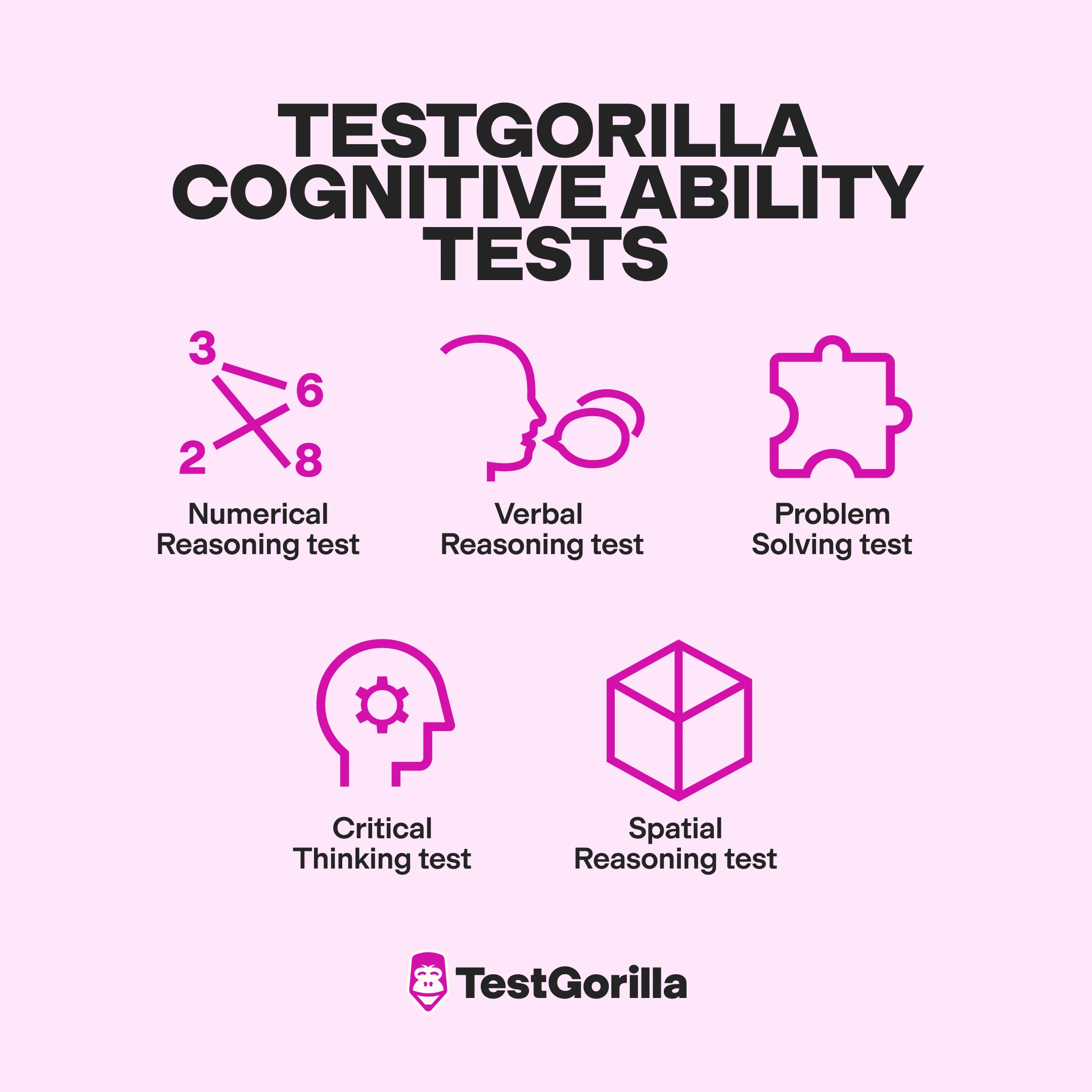When new challenges pop up at work and your team lacks the skills to handle them, deadlines slip, customer satisfaction drops, and innovation stalls.
A failsafe? Employees with fluid reasoning.
This article explains what fluid reasoning is and why it’s crucial in today’s job market. By getting a handle on this skill, you can make better hires and lead high-performing teams.
Key takeaways
Fluid reasoning means solving new problems, thinking logically, and adapting quickly.
At work, it helps employees handle challenges, adapt, and find creative solutions.
Use tools like cognitive ability tests to measure your candidates’ fluid reasoning.
Both people and teams can improve fluid reasoning through learning, brain games, and wellness.
What is fluid reasoning?
Fluid reasoning is someone’s ability to solve problems they've never encountered before – without relying solely on stored knowledge or outside guidance. It helps them process new data, recognize patterns, and make sense of complexity when there's no straightforward answer.
For example, imagine a chef’s supplier suddenly can’t deliver a key ingredient they rely on for their signature dish. Fluid reasoning would be the skill that helps the chef improvise and tweak their recipe on the spot, ensuring their diners leave happy.
Fluid reasoning vs. crystallized intelligence
In 1963, renowned cognitive psychologist Raymond Cattell introduced a new way to look at intelligence: He proposed that intelligence isn’t a single ability but can be divided into two key types:
Crystallized intelligence: Think of this as someone’s mental library of everything they’ve learned from books, school, and life experiences. As they learn and experience more, their library grows.
Fluid intelligence: This is one’s ability to think on their feet without using their crystallized intelligence. It's like navigating a new city without a map.
Crystallized intelligence grows with knowledge and experience, giving older professionals valuable wisdom. Fluid intelligence peaks earlier and may decline with age, but it’s not fixed – it can be improved with practice, challenges, and a commitment to learning.
Components of fluid reasoning
Fluid reasoning includes a bunch of thinking skills:
Problem-solving: Identifying problems, exploring solutions, and picking the best option. Example: A manager determines low team productivity is an issue, explores productivity apps, and picks one to improve workflows.
Logical thinking: Using logic – sets of arguments or reasons based on facts – to connect ideas and solve problems. Example: An accountant notices discrepancies in a financial report and methodically checks each entry to trace the source of the error.
Pattern recognition: Spotting patterns or gaps in information to make predictions. Example: A data analyst identifies trends in sales data to predict future customer demands.
Abstract thinking: Understanding complex, non-physical ideas and forming strategies. Example: A marketing coordinator comes up with a campaign idea based on the concept of “trust” to appeal to customers.
Hypothesis testing: Making guesses and testing them to reach conclusions. Example: A store manager wonders if changing the layout will boost sales and runs a trial to see if it works.
Decision making: Choosing the best option when outcomes are uncertain. Example: A team leader decides to prioritize one project over another based on limited resources and tight deadlines.
Inductive reasoning: Drawing general ideas from specifics. Example: A customer service rep notices people keep asking for the same feature and suggests adding it to the product.
Deductive reasoning: Drawing specific conclusions from general knowledge. Example: An HR manager knows good communication improves teamwork and organizes weekly team check-ins.
Why fluid reasoning is important in modern workplaces
Successful modern employees don’t succeed just because they know things. They succeed because they can deal with the sorts of unexpected issues that have become commonplace in today’s fast-changing workplaces. Employees with fluid reasoning can:
Learn new skills quickly
Solve problems without clear instructions
Think creatively under pressure
Turn setbacks into opportunities
The best insights on HR and recruitment, delivered to your inbox.
Biweekly updates. No spam. Unsubscribe any time.
How to assess fluid reasoning: Top tools
Several proven tools help organizations and individuals evaluate this critical set of cognitive skills.
Raven’s Progressive Matrices
Raven's Progressive Matrices consist of a series of non-verbal tests where each item shows a pattern with a missing piece. Test-takers must choose from multiple options the piece that completes the pattern.
These tests evaluate an individual’s ability to solve problems and think abstractly, making it ideal for roles that require innovative problem-solving. For instance, it’s particularly effective in assessing candidates for creative design or strategic planning roles.
Wechsler Adult Intelligence Scale (WAIS)
The WAIS also includes a series of named tests, such as Matrix Reasoning, Visual Puzzles, and Figure Weights. These challenge test-takers to solve puzzles, recognize patterns, and apply logic to visual information.
These tasks assess strategic thinking and problem-solving capabilities and are useful for assessing candidates for roles in emergency response, strategic planning, and project management – where quick and effective decision-making is crucial.
Cattell Culture Fair III
Created by Raymond Cattell, this test measures fluid intelligence with tasks that don’t depend on language or cultural knowledge. It uses abstract shapes to test pattern recognition and logical thinking, making it ideal for roles that require unbiased decision-making.
For instance, it works well for evaluating candidates in international roles where decisions must be free from cultural influences.
Woodcock-Johnson tests
This series of tests assesses various cognitive skills – including fluid reasoning – through various tasks. These tasks include Concept Formation, where test-takers must identify rules to group objects, plus Analysis Synthesis, which involves solving logical puzzles.
It’s great for assessing candidates in roles that involve research, complex problem-solving, and continuous learning. For instance, this test is ideal for assessing candidates in scientific research fields that require innovative problem-solving and continuous adaptation to new data.
Cognitive ability tests
Cognitive ability tests measure test-takers’ mental abilities, such as thinking clearly, solving problems, and understanding new information.
TestGorilla is an assessment provider with various cognitive ability tests for assessing a candidate's mental capabilities, which are key for jobs that need quick thinking and problem-solving. Here are some of the tests on offer:
Numerical Reasoning test: Assesses the ability to work with numbers and solve numerical problems quickly.
Verbal Reasoning test: Evaluates the ability to understand, process written information, and draw logical conclusions.
Problem Solving test: Tests candidates' ability to define problems, analyze data, and make decisions.
Critical Thinking test: Assesses skills in inductive and deductive reasoning and making sound judgments using logic and analysis.
Spatial Reasoning test: Evaluates the ability to visualize and manipulate 2D or 3D objects in space, which requires problem-solving, pattern recognition, and logical thinking.
These tests are useful across various job roles, though specific tests (like numerical reasoning) may be especially relevant in specific fields (like finance).
Situational judgement tests
Situational judgement tests present real-life work scenarios to see how candidates might handle daily challenges and decision-making in practical contexts.
TestGorilla offers various situational judgment tests, including:
Digital Agility test: Evaluates how well candidates handle new and unexpected digital challenges, testing their ability to quickly adapt and find solutions in a digital environment.
Negotiation test: Evaluates a candidate's ability to adapt and succeed in various negotiation situations.
Business Judgment test: Measures a candidate's ability to make sound decisions in complex business scenarios.
You can use these tests to assess candidates for various positions, though some tests will be more relevant to certain roles than others. For instance, the Negotiation test is great for roles requiring deal-making or conflict resolution.
How to find and hire candidates with fluid reasoning
Here’s how to recruit people with fluid reasoning:
Spotlight fluid reasoning in job ads: Clearly state the need for strong problem-solving and adaptability skills in your job ads. This sets clear expectations while attracting applicants who are confident in these areas.
Use the right tests early on: Screen all your applicants with cognitive tests that measure problem-solving and adaptability. This helps narrow down the applicant pool to those who excel in fluid reasoning.
Conduct behavioral interviews: During interviews, ask candidates to describe a time they had to adapt to a big change or solve a tough problem quickly. You might ask, “Can you tell me about a time when you had to change your project direction at the last minute? How did you handle it?” You can also pose questions with hypothetical situations: “How would you deal with [name a specific last-minute project change]?”
Think about the team: When you’re looking at candidates, consider how their fluid reasoning abilities could balance or enhance your current team’s skills. Look for those who might bring new approaches to solving problems.
Promote learning and growth: Make it clear to candidates that your company values ongoing learning and facing new challenges. This appeals to dynamic thinkers who are always looking to improve.
How can you improve fluid reasoning skills?
Fluid reasoning can be strengthened with practice. Here's how individuals and organizations can boost these essential skills.
For individuals
Here’s how individuals can strengthen their fluid reasoning:
Keep learning: Always be curious and ready to learn something new – whether through a class, book, or new hobby.
Brain games: Dive into puzzles, games like chess, or apps designed to test your thinking (such as Lumosity).
Reflect on experiences: After you finish a project or a tough task, think about how it went. What worked? What didn’t? Chatting about it with a friend or a coworker can help you do better next time.
Take care of your health: A healthy brain needs a healthy body. Make sure you're sleeping enough, eating right, and finding time to relax and unwind.
For organizations
Companies can do much to help their teams get better at fluid reasoning:
Encourage learning: Enable your team to try new things. Maybe start an "Innovation Day" each month where everyone can work on different-than-usual projects.
Team challenges: Set up activities that get people working together to solve problems, like escape rooms.
Talk about how things went: After a big project, get everyone together to talk about it. What lessons did everyone learn? What could be improved? This can help the team generate new ideas for next time.
Encourage decision-making: Let team members make key decisions in their work. This empowers them to think critically and sharpen their problem-solving skills.
Mix up the teams: When you put together new teams, bring together people from different parts of the company or with different backgrounds to bring in fresh ideas and better solutions.
Focus on wellness: Help your team keep stress in check and stay healthy. For instance, you can offer yoga classes, partner with local gyms, or provide mental health days.
Build smarter teams with fluid reasoning and talent assessments
Fluid reasoning is all about solving new problems and making decisions when there’s no clear guidance. This skill set is essential for handling challenges at work and building strong, adaptable teams.
TestGorilla’s skills tests make it easy to assess fluid reasoning during hiring. To learn more, sign up for an account or schedule a free demo.
FAQs
What does poor fluid reasoning mean?
People with poor fluid reasoning have difficulty solving new problems or adapting to unfamiliar situations. They might struggle to recognize patterns, think logically, or come up with creative solutions when no clear guidelines are available.
Does ADHD affect fluid reasoning?
Yes, ADHD can sometimes affect fluid reasoning, as challenges with focus and memory can make it harder to problem-solve and adapt quickly. That said, people with ADHD often showcase strong creative thinking and come up with unique solutions. Don’t assume that someone with ADHD has weak fluid reasoning skills simply because they have ADHD.
What part of the brain is responsible for fluid reasoning?
Fluid reasoning is primarily linked to the rostrolateral prefrontal cortex (RLPFC), a part of the brain involved in abstract thinking, reasoning, and solving new problems.
You've scrolled this far
Why not try TestGorilla for free, and see what happens when you put skills first.




















